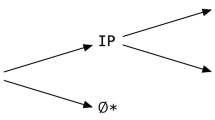Abstract
Staying power is the ability of a player to hold off choosing a strategy in a two-person game until the other player has selected his, after which the players are assumed to be able to move and countermove sequentially to ensure their best possible outcomes before the process cycles back to the initial outcome and then repeats itself (‘rational termination’). These rules of sequential play induce a determinate, Paretosuperior outcome in all two-person, finite, sequential games in which the preferences of the players are strict.
In 57 of the 78 distinct 2 × 2 ordinal games (73 percent), it makes no difference who the (second-moving) player with staying power is, but in the other 21 games the outcome is power-dependent. In all but one of these games, staying power benefits the player who possesses it.
If no player has staying power, the outcomes that result from sequential play and rational termination are called terminal; they coincide with staying power outcomes if they are Pareto-superior. Normative implications of the analysis for rationally justifying cooperation in such games as Prisoners' Dilemma and Chicken, and implementing Pareto-superior outcomes generally, are also discussed.
Similar content being viewed by others
References
Brams, Steven J.: 1975, Game Theory and Politics, Free Press, New York.
Brams, Steven J.: 1977, ‘Deception in 2 × 2 Games’, Journal of Peace Science 2, 171–203.
Brams, Steven J.: 1980, ‘Mathematics and Theology: Game-Theoretic Implications of God's Omniscience’, Mathematics Magazine 53, 177–282.
Brams, Steven J.: 1982a, ‘Omniscience and Omnipotence: How They May Help or Hurt - in a Game’, Inquiry 25, 217–231.
Brams, Steven J.: 1982b, ‘A Resolution of the Paradox of Omniscience’, in Reason and Decision, edited by Michael Bradie and Kenneth Sayre, Bowling Green Studies in Applied Philosophy, vol. III — 1981, Applied Philosophy Program, Bowling Green State University, Bowling Green, Ohio.
Brams, Steven J.: 1983, Superior Beings: If They Exist, How Would We Know? Game-Theoretic Implications of Omniscience, Omnipotence, Immortality, and Incomprehensibility, Springer-Verlag, New York.
Brams, Steven J. and Hessel, Marek P.: 1982a, ‘Absorbing Outcomes in 2 × 2 Games’, Behavioural Science 27, 393–401.
Brams, Steven J. and Hessel, Marek P.: 1982b, ‘Threat Power in Sequential Games’, mimeographed.
Brams, Steven J. and Wittman, Donald: forthcoming, ‘Nonmyopic Equilibria in 2 × 2 Games’, Conflict Management and Peace Science.
Dubey, P. and Shapley, L. S.: 1979, ‘Mathematical Properties of the Banzhaf Index’, Mathematics of Operations Research 4, 99–131.
Frank, Arthur Q. and Shapley, Lloyd: 1981, ‘The Distribution of Power in the U.S. Supreme Court’, Rand Note N-1735-NSF.
Hessel, Marek: 1982, ‘Sequential Games and Their Solutions’, mimeographed.
Kilgour, D. Marc: 1982, ‘Equilibria for Far-Sighted Players’, mimeographed.
Lucas, William, F.: 1976, ‘Measuring Power in Weighted Voting Systems’, Case Studies In Applied Mathematics, edited by M. D. Thompson, Mathematical Association of America, Washington, D.C.
Nagel, Jack H.: 1975, The Descriptive Analysis of Power, Yale University Press, New Haven.
Nash, J.: 1951, ‘Non-cooperative Games’, Annals of Mathematics 54, 286–295.
Nurmi, Hannu, 1980, ‘Game Theory and Power Indices’, Zeitschrift für Nationalökonomie 40, 35–58.
Owen, Guillermo: 1971, ‘Political Games’, Naval Research Logistics Quarterly 18, 345–355.
Owen, Guillermo and Grofman, Bernard: 1982, ‘Coalitions and Power in Political Situations’, mimeographed.
Rapoport, Anatol and Guyer, Melvin: 1966, ‘A Taxonomy of 2 × 2 Games’, General Systems: Yearbook of the Society for General Systems Research 13, 195–210.
Rice, Peter: 1979, ‘The Finite Negotiation Problem’, Journal of Conflict Resolution 23, 561–576.
Shapley, L. S.: 1977, ‘A Comparison of Power Indices and a Nonsymmetric Generalization’, Rand Paper P5827.
Shenoy, Prakash, P.: 1982, ‘The Banzhaf Power Index for Political Games’, Mathematical Social Sciences 2, 299–315.
Straffin, Philip D., Jr.: 1977, ‘Homogeneity, Independence, and Power Indices’, Public Choice 30, 108–118.
Thompson, Earl A. and Faith, Roger L.: 1981, ‘A Pure Theory of Strategic Behavior and Social Institutions’, American Economic Review 71, 366–380.
Author information
Authors and Affiliations
Rights and permissions
About this article
Cite this article
Brams, S.J., Hessel, M.P. Staying power in sequential games. Theor Decis 15, 279–302 (1983). https://doi.org/10.1007/BF00125673
Issue Date:
DOI: https://doi.org/10.1007/BF00125673




